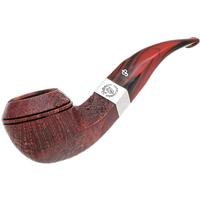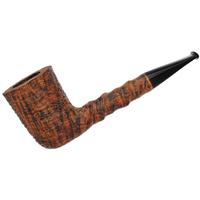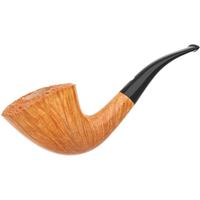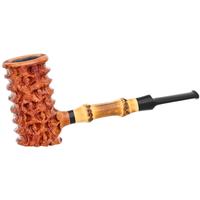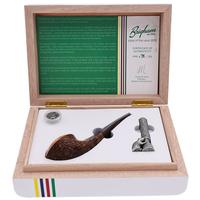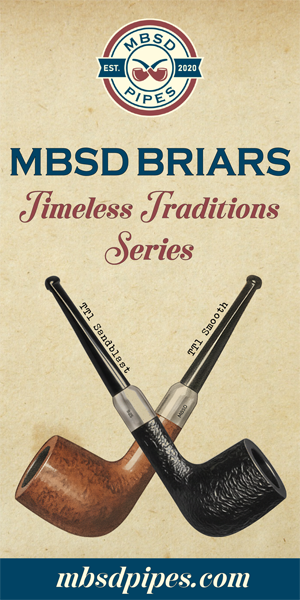Help: Comoy's "Specimen" 77008 Magnum (Huge!) Sitter
- Thread starter Humblepipe
- Start date
You are using an out of date browser. It may not display this or other websites correctly.
You should upgrade or use an alternative browser.
You should upgrade or use an alternative browser.
I am curious about the 5-digit nomenclature "77008"
Given the size of this pipe, I believe that the number is actually its ZIP Code!
Given the size of this pipe, I believe that the number is actually a ZIP Code!
Well everything is bigger in Texas
I'd have to agree, numbers look to be different sizes also.Also as for the stamp. The 77 and 008 almost look like two seperate stamps.
No idea what you are referring toI misspelled "specimen". Apologies. Unable to edit... wish they would fix that! Now my spelling issue is forever memorialized.

No idea what you are referring to
I am grateful, sir!
It’s such a cool pipe that looks melted. I have seen some from the late 80s, sets typically of 3, but they just aren’t as smooth as this one. Given the tenon, I think it’s post 1960s. Most higher grade Comoys that I have seen have a reinforced stepped tenon but those were from the 50s and earlier.
Looks like they were doing crazy shit in the 40s.
I misspelled "specimen". Apologies. Unable to edit... wish they would fix that! Now my spelling issue is forever memorialized.
And I was thinking he could use the humility...No idea what you are referring to
It's most likely a Horry Jamieson pipe, he left Barling in 1960 to work for Cadogan. He was responsible for the Uniques, Freehands, Colossals, many of the collector shapes, and one off high grade specimens. The melty looking foot was a hallmark of his and I think makes attributing it to him a no brainer.
In the 1960's GBD and Comoy's shared a manufacturing facility and Horry also made pipes for Comoy. This most likely one of those pipes.
other examples of Horry's work
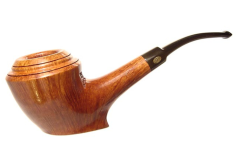
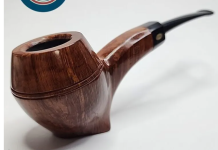
In the 1960's GBD and Comoy's shared a manufacturing facility and Horry also made pipes for Comoy. This most likely one of those pipes.
other examples of Horry's work


Last edited:
@sablebrush52 & @jguss know far more about Horry than I could ever hope to. Maybe they'll weigh in on the pipe.
@sablebrush52 & @jguss know far more about Horry than I could ever hope to. Maybe they'll weigh in on the pipe.
I did a moderate dive into Horry Jameson (no "i") a number of years ago and here's a quick précis drawn from a slightly edited email I shared with a friend in 2015:
Horace Jameson was born on July 2, 1906 in London (the parish of Homerton St Paul in Hackney, to be specific) to William John Jameson (1867-1927) and Jane Maria Grover (1870-1955). His father had nothing to do with the pipe or tobacco trades; he is variously described as a rug dresser, rug finisher, sheep skin rug dresser, etc. The Jamesons had been in the London area since at least the mid-1700s.
Horace was one of ten sons, nine of whom survived to maturity; the sort of astonishing fertility you see in late Victorian/Edwardian families, but seems unbelievable today. It is interesting to note that at least one of the other children, the eldest son William, was also in the pipe trade for some period of time. The 1911 census, when the family was still living in Hackney, describes him as a “briar pipe fitter”. While pure speculation, it’s tough to resist the inference that Horace’s entry into the trade a few years later was directly related to his older brother’s involvement. Was William at Barling too? Is that how Horry wound up there for the early part and majority of his working life?
As for when Horace started in the business, I have an article I found on the subject of “freak” carvings (which was discussed a few months back on pipesmagazine.com) which specifically states that he began at the age of 14; this would suggest that Horry started in 1920, perhaps plus or minus a year. This is consistent with workmen at Barling and other pipe manufacturers who we know started at about the same age, based on trade journal articles that I have previously dug up.
Horry married a woman named Gladys May Bale in 1952 at the fairly advanced age of 45. He died on May 17, 1984, and his wife Gladys (who had been born in 1920, about the time Horry started at Barling) survived him by another 25 years. And there we have a missed opportunity. She only died six years ago; think how much we could have learned by talking to her! I will note in passing that Horry and Gladys had a daughter born in late 1952, named Jenny F. Jameson. She married a man named [redacted] in Hackney in 1973, and is presumably still alive. She might well be an interesting source of information if you wanted to track her down and chance a telephonic interview. It just hasn’t been high enough on my list to do.
The details on Horry’s career are a bit murky. I think the heart of it is that he spend over forty years at Barling, with a clear specialty niche in the area of what they called “freak briars”. Jameson left in the wake of the various disruptions which followed the Finlay acquisition, landing at Cadogan; certainly the next phase of his career shows work done for both GBD and Comoy. Pipes that Pete [Siegel, active in the American pipe and tobacco business at this time] saw in about 1980 were according to him sub-standard, hardly surprising since Jameson would have been about 76 at the time, and may well have not been as actively involved in the carving as he had been. [n.b.: to this I'd add that it was about this time that all production was centralized by Cadogan and the distinction between GBD and Comoy became more notional than real]
Here for those who haven't seen it is the trade journal article on Freaks:
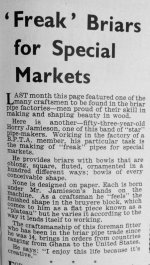
And for the insatiably curious here is a photo of Horry (hands only, I don't have a photo of his face) at work:
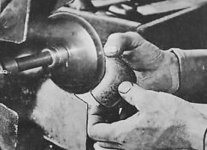
I did a moderate dive into Horry Jameson (no "i") a number of years ago and here's a quick précis drawn from a slightly edited email I shared with a friend in 2015:
Horace Jameson was born on July 2, 1906 in London (the parish of Homerton St Paul in Hackney, to be specific) to William John Jameson (1867-1927) and Jane Maria Grover (1870-1955). His father had nothing to do with the pipe or tobacco trades; he is variously described as a rug dresser, rug finisher, sheep skin rug dresser, etc. The Jamesons had been in the London area since at least the mid-1700s.Horace was one of ten sons, nine of whom survived to maturity; the sort of astonishing fertility you see in late Victorian/Edwardian families, but seems unbelievable today. It is interesting to note that at least one of the other children, the eldest son William, was also in the pipe trade for some period of time. The 1911 census, when the family was still living in Hackney, describes him as a “briar pipe fitter”. While pure speculation, it’s tough to resist the inference that Horace’s entry into the trade a few years later was directly related to his older brother’s involvement. Was William at Barling too? Is that how Horry wound up there for the early part and majority of his working life?As for when Horace started in the business, I have an article I found on the subject of “freak” carvings (which was discussed a few months back on pipesmagazine.com) which specifically states that he began at the age of 14; this would suggest that Horry started in 1920, perhaps plus or minus a year. This is consistent with workmen at Barling and other pipe manufacturers who we know started at about the same age, based on trade journal articles that I have previously dug up.Horry married a woman named Gladys May Bale in 1952 at the fairly advanced age of 45. He died on May 17, 1984, and his wife Gladys (who had been born in 1920, about the time Horry started at Barling) survived him by another 25 years. And there we have a missed opportunity. She only died six years ago; think how much we could have learned by talking to her! I will note in passing that Horry and Gladys had a daughter born in late 1952, named Jenny F. Jameson. She married a man named [redacted] in Hackney in 1973, and is presumably still alive. She might well be an interesting source of information if you wanted to track her down and chance a telephonic interview. It just hasn’t been high enough on my list to do.The details on Horry’s career are a bit murky. I think the heart of it is that he spend over forty years at Barling, with a clear specialty niche in the area of what they called “freak briars”. Jameson left in the wake of the various disruptions which followed the Finlay acquisition, landing at Cadogan; certainly the next phase of his career shows work done for both GBD and Comoy. Pipes that Pete [Siegel, active in the American pipe and tobacco business at this time] saw in about 1980 were according to him sub-standard, hardly surprising since Jameson would have been about 76 at the time, and may well have not been as actively involved in the carving as he had been. [n.b.: to this I'd add that it was about this time that all production was centralized by Cadogan and the distinction between GBD and Comoy became more notional than real]
Here for those who haven't seen it is the trade journal article on Freaks:
View attachment 305983
And for the insatiably curious here is a photo of Horry (hands only, I don't have a photo of his face) at work:
View attachment 305984
@jguss... the man, the myth, the legend.
Great thread thanks to all the contributions made. Thanks, everyone. jguss and rustypiles first and foremost. The pipe is now on its way to another forum member, who I consider a friend (I will allow him to remain anonymous unless he want to self identify LOL). Anyway, I very much appreciate learning about the pipe's origin and background. Grateful!
Let me know what you are thinking, I can change the title to anything you want!And I was thinking he could use the humility...

Let me know what you are thinking, I can change the title to anything you want!

"Proudpipe"????
My first thought when I saw this pipe was that it was probably made by Horry Jameson.@sablebrush52 & @jguss know far more about Horry than I could ever hope to. Maybe they'll weigh in on the pipe.
How do you pronounce “Horry”?
Since his name was Horace, I would think “Whore-ee.”
How do you pronounce “Horry”?
Not like it’s spelled. It’s actually pronounced /ˈslʌt̬.i/. And don’t get me started on his younger brother /ˈhɔːr.ni/ Jameson.



